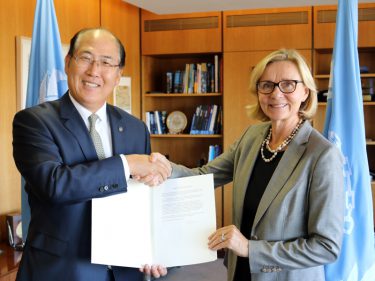
With Finland’s accession of the International Ballast Water Management (BMW) Convention, the International Maritime Organization (IMO) said that the remaining condition for entry into force has been met and therefore the BWM Convention is scheduled to enter into force on September 8, 2017.
IMO has approved draft amendments to the Convention’s implementation scheme and if adopted in October 2016, then approved ballast water treatment systems meeting the D-2 biological standard will need to be installed on new ships constructed on or after September 8, 2017, as well as on existing ships, not later than the first MARPOL IOPP Renewal Survey carried out on/after September 8, 2017.
Accession by Finland has triggered the entry into force of a key international measure for environmental protection that aims to stop the spread of potentially invasive aquatic species in ships’ ballast water.
BWM Convention’s entry into force will mark a landmark step towards halting the spread of invasive aquatic species, which can disrupt local ecosystems, affect biodiversity and lead to substantial economic loss.
Under the Convention’s terms, ships will be required to manage their ballast water to remove, render harmless, or avoid the uptake or discharge of aquatic organisms and pathogens within ballast water and sediments
“The entry into force of the Ballast Water Management Convention will not only minimize the risk of invasions by alien species via ballast water, it will also provide a global level playing field for international shipping, providing clear and robust standards for the management of ballast water on ships,” said IMO Secretary-General Kitack Lim.
Ambassador Extraordinary and Plenipotentiary, Permanent Representative of Finland to IMO, Päivi Luostarinen, handed over the country’s instrument of acceptance to the Ballast Water Management Convention to IMO Secretary-General Lim today.
The accession brings the combined tonnage of contracting States to the treaty to 35.1441%, with 52 contracting Parties. The convention stipulates that it will enter into force 12 months after ratification by a minimum of 30 States, representing 35% of world merchant shipping tonnage.
The BWM Convention was adopted in 2004 by the International Maritime Organization (IMO), the United Nations specialized agency with responsibility for developing global standards for ship safety and security and for the protection of the marine environment and the atmosphere from any harmful impacts of shipping.